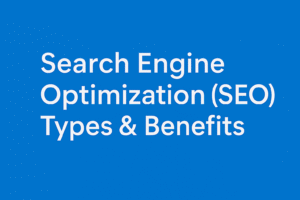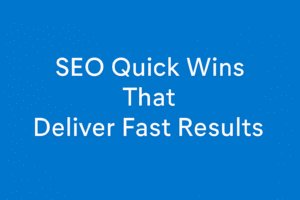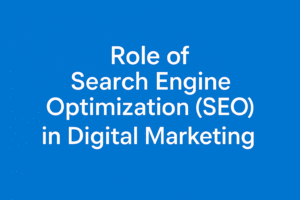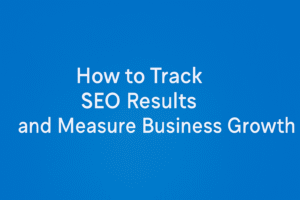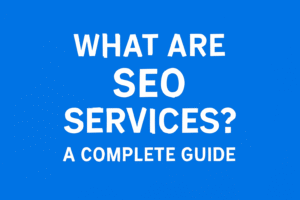Search Engine Optimization (SEO) is the process of improving your website’s visibility in search engine results so that it can attract more visitors — without relying solely on paid ads. When done right, SEO helps your site appear for the keywords and phrases your target audience is actively searching for, whether they’re looking for a product, a service, or valuable information.
Think of SEO as both an art and a science:
- Art, because it requires crafting compelling, helpful content that appeals to real people through a clear SEO and content strategy.
- Science, because it involves technical adjustments and strategic keyword targeting to satisfy search engine algorithms — the very core of the role of search engine optimization.
Why SEO Matters for Your Business
Whether you’re a small business owner in Dubai, a startup in Sharjah, or an established brand in Abu Dhabi, SEO levels the playing field. A well-optimized website ensures that:
- Potential customers can find you when they need you.
- You establish authority and trust in your industry.
- You get consistent, long-term organic traffic without overpaying for ads.
Local businesses, in particular, benefit from appearing in Google’s local map pack and organic search results. That means someone searching “best digital marketing agency in Ras Al Khaimah” is more likely to find you instead of your competitor.
How Search Engines Work
Search engines like Google use automated bots (crawlers) to scan the internet, index pages, and rank them based on hundreds of factors — from keyword relevance to website speed and mobile-friendliness. Your job with SEO is to make it as easy as possible for these bots to:
- Find your website.
- Understand what it’s about.
- Decide it’s the most relevant, trustworthy result for the searcher
In this guide, we’ll break down the core SEO strategies — from keyword research to Google My Business optimization — and show you how to apply them in a way that works for both global and local SEO needs.
Keyword Research and Targeting
Keyword research is the foundation of every successful SEO strategy. If you do not know the exact words and phrases your audience is typing into Google, you are essentially guessing what to optimize for. The right keywords help your content appear in front of the right people at the right time, which increases your chances of attracting quality traffic and turning visitors into customers.
A solid keyword plan takes into account various types of search engine queries, from informational to transactional, and how those align with your business goals. By mapping keywords to intent, you’re effectively building the foundation of a long-term SEO strategy.
Identify Relevant Keywords
Start by understanding your audience’s intent. Are they searching for information, looking to make a purchase, or comparing options? Each intent type requires different keywords. For example:
- Informational intent: “how to improve website SEO”
- Transactional intent: “SEO services in Dubai”
- Navigational intent: “Infinitra Web contact”
A key part of this process is considering your business location. If you target customers in specific cities like Dubai, Sharjah, Abu Dhabi, Ras Al Khaimah, Al Ain, or Ajman, adding those locations to your keywords will help you appear in local searches. This is where understanding the difference between local SEO and traditional SEO becomes important. If you want to learn more about which approach fits your business best, read our detailed guide on Local vs Traditional SEO.
Target Your Keywords
Once you know which keywords matter most, you need to place them strategically throughout your website. This includes:
- Page titles and meta descriptions
- Headings (H1, H2, etc.)
- Body text within your content
- Image alt tags and file names
- URLs
If your business serves multiple cities, it is highly effective to create dedicated location pages for each one. For example, instead of having a single page that lists “SEO services in Dubai, Sharjah, Abu Dhabi, Ras Al Khaimah, Al Ain, and Ajman,” you would create a separate, optimized page for each location. This approach allows you to:
- Target city-specific keywords more precisely.
- Provide localized content that resonates with customers in that area.
- Increase your chances of ranking in local search results and Google Maps for that city.
The key is to use your keywords naturally across these location pages. Avoid keyword stuffing, as it can harm both user experience and rankings.
Consider Long-Tail Keywords
Long-tail keywords are longer, more specific search phrases. For example:
- Short keyword: SEO
- Long-tail keyword: affordable SEO optimization for e-commerce websites in Dubai
These terms might have lower search volumes, but they often attract highly targeted visitors who are closer to making a decision. They are essential in a long term SEO strategy because they reduce competition and can deliver consistent traffic over time.
By starting with strong keyword research, you build the roadmap for the rest of your SEO efforts. It tells you what to write, how to optimize, and how to make your site more visible to the right audience.
On-Page SEO Optimization

On-page SEO refers to the changes and improvements you make directly on your website to improve its search engine rankings and user experience. While keyword research tells you what topics to target, on-page optimization ensures that your site clearly communicates those topics to both visitors and search engines.
This process ties closely with search engine optimization for business since the way you structure content, titles, and metadata directly impacts visibility and conversions.
Optimize Title Tags
The title tag is one of the most important on-page ranking factors. It appears as the clickable headline in search engine results and should:
- Contain your primary keyword naturally.
- Accurately describe the page content.
- Stay under 60 characters to display fully in search results.
Example:
Instead of “SEO | Infinitra Web” use “SEO Services in Dubai | Top SEO Agency”
Write Compelling Meta Descriptions
While meta descriptions are not a direct ranking factor, they influence click-through rates. They should:
- Be around 150–160 characters.
- Include your main keyword and location if relevant.
- Give users a clear reason to visit your page.
Optimize Header Tags (H1–H6)
Headers break your content into logical sections, making it easier for both humans and search engines to read.
- Use one H1 tag for the page’s main topic.
- Use H2 and H3 tags for subtopics, incorporating related keywords naturally.
Optimize Images
Images not only make your content visually appealing but also provide SEO opportunities.
- Use descriptive file names (e.g., “seo-services-dubai.jpg” instead of “IMG001.jpg”).
- Add alt text that explains what the image shows and includes relevant keywords.
- Compress images for faster load times without sacrificing quality.
Create High-Quality Content
Your content should be valuable, informative, and engaging. Avoid keyword stuffing, duplicate content, or writing solely for search engines. For more on avoiding common SEO mistakes, check out our article on 7 SEO Myths.
Optimize URL Structure
Short, descriptive URLs are easier for users to remember and for search engines to understand.
Example:
- Good: yourwebsite.com/seo-services-dubai
- Bad: yourwebsite.com/page?id=34
Internal Linking
Link to other relevant pages on your site to:
- Guide visitors to more information.
- Help search engines discover and index new content.
- Spread link authority across your site.
Technical SEO Best Practices

Technical SEO focuses on the behind-the-scenes aspects of your website that make it easier for search engines to crawl, index, and rank your pages. Even with great content, your site will struggle if it is slow, hard to navigate, or poorly structured. A technically sound site is often the result of thoughtful SEO web development that prioritizes both user experience and algorithmic requirements.
Ensure Crawlability and Indexability
Search engines use automated bots to discover and index web pages. If your site’s structure is confusing or important pages are blocked, those pages may never appear in search results.
- Keep your navigation simple and logical so crawlers can follow links easily.
- Avoid long chains of subpages that make content harder to reach.
- Check your indexing status regularly in Google Search Console.
Use a Robots.txt File
The robots.txt file tells search engines which parts of your site they can or cannot crawl.
- Allow crawlers access to all essential pages.
- Block duplicate or low-value pages that do not need to appear in search results.
- Be careful: a wrong command here can remove your entire site from search engines.
Submit an XML Sitemap
An XML sitemap is like a roadmap of your website for search engines. It lists your important pages and helps them get discovered faster.
- Submit your sitemap through Google Search Console.
- Update it whenever you add or remove important pages.
- Keep it clean — remove broken links and outdated URL
Fix Broken Links
Broken links hurt both user experience and search rankings.
- Use link-checking tools to find and fix them regularly.
- Redirect old or removed pages to relevant, working URLs.
- For larger businesses in Dubai, Sharjah, Abu Dhabi, Ras Al Khaimah, Al Ain, and Ajman, ongoing website maintenance (often part of professional web development services) can keep this under control.
Improve Website Speed
Page speed is a confirmed Google ranking factor, and users are unlikely to wait more than a few seconds for a page to load.
- Compress images and enable browser caching.
- Use a reliable hosting provider.
- Minimize the use of heavy scripts and plugins.
- A well-built site from the start — like those created through expert web development services in the UAE — can make a big difference in speed.
Make Website Mobile-Friendly and Responsive
With most searches now happening on smartphones, mobile-friendliness is essential. Google uses mobile-first indexing, which means it primarily looks at your site’s mobile version when deciding rankings.
- Ensure your site adapts to different screen sizes and devices.
- Test mobile usability in Google Search Console.
- Use larger, tappable buttons and avoid small text that is hard to read.
- A responsive design is a long-term investment for better user experience and SEO.
By following these technical SEO best practices, you create a strong foundation for all your other optimization efforts. Without them, even the best keyword targeting and content strategy may fail to deliver results.
Off-Page SEO Strategies
While on-page SEO focuses on optimizing the content and structure of your own website, off-page SEO involves actions you take outside your site to boost its authority and visibility. These external signals help search engines understand how trustworthy and relevant your website is compared to others in your industry.
Build Backlinks
Backlinks are links from other websites pointing to yours. They act as “votes of confidence” in your content. The more high-quality backlinks you have, the more search engines trust your site.
- Focus on earning links from reputable, industry-relevant websites.
- Publish valuable content, such as guides, case studies, or research, that others will want to reference.
- Avoid spammy link-building schemes — these can do more harm than good. For more tips on ethical link building, see our guide on the Do’s and Don’ts of SEO.
Promote Your Content
Even the best content will go unnoticed without promotion. Share your articles, videos, and resources on channels where your audience spends time.
- Use social media platforms like LinkedIn, Instagram, and Facebook to reach new audiences.
- Collaborate with local influencers or businesses
- Participate in online communities, forums, or groups related to your niche
Engage With Your Audience
Search engines value brands that foster active engagement. When people interact with your business online, it signals trust and relevance.
- Respond to comments on your blog and social media posts.
- Answer questions on industry-related forums.
- Encourage satisfied customers to leave reviews on platforms like Google, Facebook, and industry-specific directories.
By focusing on these off-page strategies, you can steadily build your website’s reputation and authority. Combined with strong on-page and technical SEO, this will help your site climb the search rankings and attract more qualified visitors.
Google My Business (GMB) Optimization

For businesses that target customers in specific geographic areas, Google My Business (now officially called Google Business Profile) is one of the most powerful local SEO tools available. It allows your business to appear in local search results and Google Maps, helping you attract customers who are actively looking for your products or services nearby.
If you are not using GMB effectively, you could be missing out on a significant amount of local traffic. To understand its importance in detail, see our guide on Why Google Business Profile Matters.
Why GMB Matters for Local SEO
When someone searches for “SEO services in Dubai” or “web development in Sharjah,” Google often displays a map with the top local results above the regular organic listings. This “Local Map Pack” gets a large share of clicks because it appears prominently and provides immediate business information.
A well-optimized GMB profile helps you:
- Show up in local searches for your services.
- Increase trust through reviews and ratings.
- Drive more calls, visits, and inquiries directly from search results
Setting Up and Verifying GMB
- Claim your business through the official Google Business Profile platform.
- Verify ownership by receiving a postcard, phone call, or email from Google.
- Once verified, you gain full control to edit and optimize your listing.
Adding Business Details, Photos, and Updates
- Include accurate Name, Address, and Phone number (NAP) information that matches your website exactly.
- Add high-quality images of your office, products, and team to make your profile more appealing.
- Use the “Posts” feature to share updates, promotions, or events for customers
Managing Reviews and Q&A
- Encourage happy customers to leave positive reviews, as they are a strong ranking signal for local search.
- Respond to all reviews — both positive and negative — to show that you value customer feedback.
- Use the Q&A section to answer common customer questions directly on your profile.
A well-maintained GMB listing not only improves your local rankings but also builds trust with potential customers before they even visit your website.
Monitoring, Measuring, and Adjusting SEO Efforts
SEO is not a one-time project — it is an ongoing process that requires regular monitoring and adjustments. Understanding that SEO takes time to get results is critical, but there are also SEO quick wins you can implement to gain momentum early.
Performance tracking also reveals how long certain changes take to impact rankings, which ties into the bigger picture of SEO how long does it take when planning campaigns with SEO agencies.
Using Google Search Console and Google Analytics
Google Search Console provides valuable insights into how your site is performing in search results. You can:
- See which keywords bring the most traffic.
- Monitor indexing status and fix crawl errors.
- Check mobile usability and Core Web Vitals.
Google Analytics shows how visitors interact with your site:
- Which pages get the most views.
- How long visitors stay on your site.
- Which traffic sources lead to the most conversions.
Together, these tools give you a clear picture of your SEO health.
Monitoring Rankings
Keyword rankings can change daily, especially in competitive markets. Regularly tracking your rankings for target terms — such as “SEO services in Dubai” or “website development in Sharjah” — helps you spot trends and respond quickly.
If you notice a drop for important keywords, you can investigate and adjust your strategy before it affects your traffic.
SEO tracking should not be done in isolation. It works best when it’s part of your broader marketing strategy, aligning with content creation, social media, and advertising efforts. For a deeper look at this integrated approach, see our guide on SEO in Marketing.
By combining regular monitoring with timely adjustments, you can maintain strong rankings and adapt to both algorithm changes and shifting customer expectations.
How Infinitra Web Can Help with SEO
Improving the SEO of your website is not about applying one or two quick fixes — it’s about building a long-term, strategic approach. From keyword research and on-page optimization to technical improvements, off-page authority building, and Google My Business optimization, each element works together to boost your visibility, attract more organic traffic, and convert visitors into customers.
The most successful SEO strategies are consistent, adaptable, and supported by accurate data. By monitoring your rankings, tracking visitor behavior, and making adjustments based on real performance, you can keep your website competitive even as search trends and algorithms change.
At Infinitra Web, we specialize in helping businesses in UAE across Dubai, Sharjah, Abu Dhabi, Ras Al Khaimah, Al Ain, and Ajman achieve sustainable growth through expert SEO and professional web development. Our team focuses on creating search-friendly, user-focused websites and implementing proven optimization strategies tailored to each client’s needs.
Whether you need local SEO to dominate your city’s search results or a complete website redesign to improve speed and responsiveness, we provide end-to-end solutions that deliver measurable results. If you’re ready to take your online presence to the next level, explore our dedicated SEO services and web development services pages to see how we can help your business stand out.


